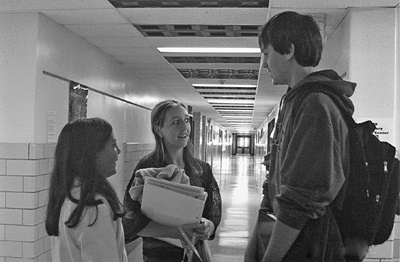All Nonfiction
- Bullying
- Books
- Academic
- Author Interviews
- Celebrity interviews
- College Articles
- College Essays
- Educator of the Year
- Heroes
- Interviews
- Memoir
- Personal Experience
- Sports
- Travel & Culture
All Opinions
- Bullying
- Current Events / Politics
- Discrimination
- Drugs / Alcohol / Smoking
- Entertainment / Celebrities
- Environment
- Love / Relationships
- Movies / Music / TV
- Pop Culture / Trends
- School / College
- Social Issues / Civics
- Spirituality / Religion
- Sports / Hobbies
All Hot Topics
- Bullying
- Community Service
- Environment
- Health
- Letters to the Editor
- Pride & Prejudice
- What Matters
- Back
Summer Guide
- Program Links
- Program Reviews
- Back
College Guide
- College Links
- College Reviews
- College Essays
- College Articles
- Back
Teens and the Democratic Process: Are We Prepared?
For many teens, politics may seem like an irrelevant issue. However, when a teen turns 18 and it’s time to start making decisions that not only affect them but their country as a whole, many teens might find themselves feeling unprepared and overwhelmed. Teens should take it upon themselves to interact within their community and educate themselves in order to prepare for full civic engagement. Politics is defined as the activities associated with the governing of a state or country, but for many people, politics have a much deeper meaning. Teens might not understand what exactly politics is or how their choices affect the government. When young people are educated about politics, the United States will continue to have critically-thinking voters. Becoming a part of the democratic process takes education, thought, and interest in order to make the most informed decision possible as a voter.
Many teens think that it is only possible to be involved in politics once one turns 18 and is eligible to vote. This is untrue. When teens are educated about politics at a younger age, it is possible to make a much more informed, educated decision once one is eligible to vote. In fact, events that occur between ages 14-24 tend to affect a teen’s political outlook the most. When a teen takes it upon him- or herself to become educated and interested in politics, the more likely they will be able to make an independent, informed decision when they turn 18. Studies show that among many key factors, education is the most important factor when it comes to increasing voter turnout and involvement in politics. Education about politics and how elections and party systems work can help teens form their own notions about politics, as well as adopting their parents’ ideas. Statistics show that 71 percent of teens have the same political stance as their parents, 21 percent are more liberal, and only 7 percent are more conservative. Whether a teen decides to stay true to a parent’s political perspective or to make their own decision, being educated about politics at a young age will help create more informed voters. Education will also help young voters to think critically, which is essential when you are choosing a candidate to vote for. In school and when learning about politics outside of school, teens learn to seek more facts, question authority, and weigh both sides of an argument. All of these skills help to create young, prepared voters.
When talking about politics and teenage involvement, it becomes necessary to ask a broader question: what is politics? Chances are, if you mention elections or the last debate, teens will appear uninterested. However, if you bring up issues like drinking or driving age, or drug legalization, they will want to be much more involved. Issues such as these have a direct affect on a teen’s life, and are much more likely to draw interest. Aren’t these political issues, too? Even before age 18, teens should be able to get involved and share their opinions about tough topics. Teens should take it upon themselves to be more interested in topics that affect them. Even though it may seem that the government’s decisions about taxation wouldn’t affect a 13-year-old, they do in the long run. By becoming more involved and exploring topics beyond things like drinking and driving age, teens can prepare themselves to be a full-fledged member of society at 18.
Some teens may wonder, “Well, why should I pay attention?” Truthfully, many decisions made by politicians will affect teens. When educated about these issues, teens can have positive impacts on their country and community. When not educated about politics from a young age, there is a chance that voters could make a decision without understanding the platforms and issues that their favored candidate has. Even before age 18, teens can be involved in politics. Teens have many opportunities to be involved, such as writing to senators, helping campaign for candidates, joining non-partisan organizations, and supporting local politicians. When teens become more involved in politics, the whole democratic process benefits.
Whether it’s simply learning about politics or going out and voting, when teens become more educated it will help ensure that our country continues its legacy as a great nation. Teens should be sure to prepare themselves to become part of our democratic process. Young teens should be educated about politics so they can make educated decisions at age 18. When teens are involved in topics that interest them, they can be inspired to educate themselves and others about politics, which will help them become educated members of society later in life. Lastly, our country’s teens need to realize exactly how much politics affect them, and how much of an impact they can make on society. Educated, critically-thinking, and interested teens can help to participate in our country’s democratic process and have positive effects for everyone.

Similar Articles
JOIN THE DISCUSSION
This article has 0 comments.
